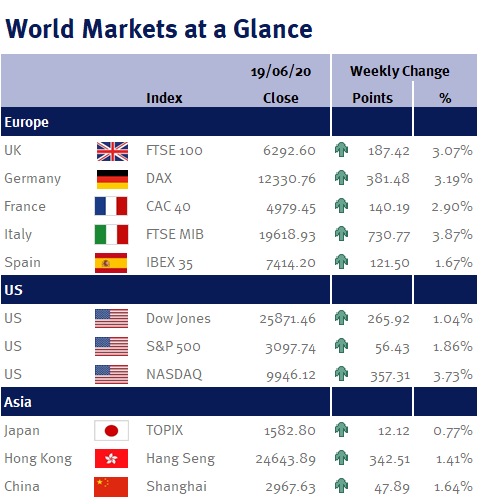Equity markets often tend to overshoot on both the upside and downside and while this week may have brought back the unpleasant memories from the February and March equity market volatility, we actually feel that this week’s falls simply reflect the fact that the recent gains got a little overheated. As such we certainly don’t believe that this week’s falls signify a new downward trend – and as a consequence, we don’t currently see any reason to panic as there has not been a fundamental shift downward.
To us, this was evident because some of this week’s biggest fallers have been those stocks that have recently rallied strongly, but are still very much exposed to the ongoing impact of the coronavirus lockdown restrictions, such as IAG (the owner of British Airways); easyJet; Carnival Cruises; and InterContinental Hotels.
This week’s economic news was dominated by Wednesday’s (10 June 2020) Fed monetary policy meeting, where the Fed’s Chair, Jay Powell, filled us with confidence that the US central bank will continue to provide whatever stimulus is needed to support the economy until it recovers.
Elsewhere, while UK GDP data grabbed today’s (Friday 12 June 2020) headlines with a contraction of 20.4% in April, it didn’t actually tell us anything we didn’t already know – i.e. the economy has hit a brick wall.
However, there was plenty of economic data this week that encouragingly showed green shoots are starting to appear now that the coronavirus lockdown restrictions are starting to be lifted. For example, today’s University of Michigan Consumer Sentiment Index showed confidence improved for a second month to 78.9 from 72.3 in May, while its Expectations Index (which shows how consumers view prospects for their own financial position and that of the general economy over the long-term), jumped to 73.1 from 65.9, which provides us with comfort that consumption behaviour is unlikely to see any permanent damage from the coronavirus outbreak and rise in unemployment.
Looking ahead to this coming week, from the UK we have employment data (unemployment rate and weekly earnings); CPI inflation; retail sales and a BoE monetary policy meeting. From the US we have retail sales; industrial production; housing starts; and of course the weekly jobless claims; while from China we have industrial production and retail sales data.
Investment Management Team


